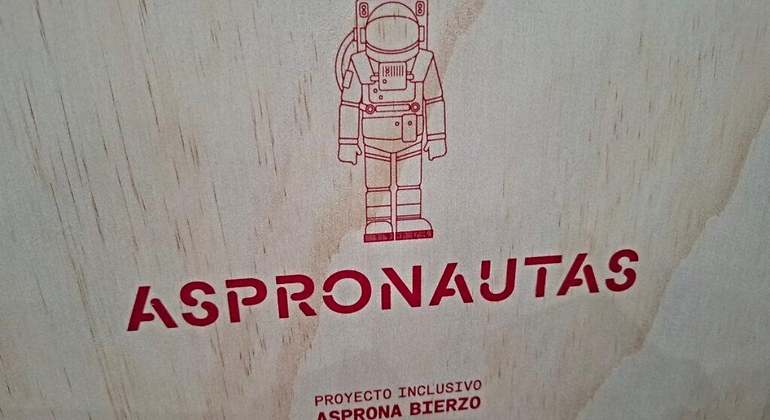Miguel Ángel, Teresa, Guillermo and Baldomero They are the crew members of a very special mission: to make a wine “with a flavor of inclusion.” There are four people with disabilities who are part of the Asprona Bierzo association who have managed to develop a unique broth: Aspronauts.
This Sunday, November 24, commemorates the World Red Wine Daysince at the end of November winegrowers and winemakers celebrate the harvest and prepare for the winemaking process, which culminates in the creation of red wines. Aspronautas is a young wine from Mencía with a small percentage of white and many degrees of humanity, the result of the collaboration between Asprona Bierzo for people with intellectual disabilities and the 13 Viñas Winery.
“It is a wine that smells and tastes of inclusion”as the promoter of the initiative, Vanessa Silván, points out in an interview with Servimedia. The story of Aspronautas is born from a very special strain, that of inclusion. “It all started with the pandemic,” says Silván. “We decided to open smaller centers (they were like the rings of Saturn), and we named that project Saturn. On the other hand, we had the Asprowine project that revolved around wine.”
“The name Aspronautas alludes to that journey of inclusion and search for new worlds and opportunities for people with intellectual disabilities”he points out. Miguel Ángel Amoedo, Teresa Lorenzo, Guillermo Álvarez and Baldomero García are the parents of this very special Mencía. They have not only been in charge of cultivating it. Their sensitivity and way of treating the grapes has given this wine ‘a nuance of inclusion’, which only they could achieve.
Little by little
Teresa is 38 years old and he has been doing internships for two years at the Miño-Sil Hydraulic Confederation where, he explains, “I scan documents, I review papers, but since I have two days free I have been able to do this wine thing.” On Tuesdays and Thursdays he goes to the winery or the vineyard, depending on the situation, where he is learning the trade of wine. He assures that pruning has “its hard moments”, but he is always accompanied by one of his colleagues and it makes it more bearable.
Teresa, like the rest of the Aspronautas team, has already tasted the broth and admits that she likes it and that on the day of the presentation (last October) “Everyone congratulated him.” This young woman’s family has vineyards in the area and expresses her desire to make her own wine in the future.
The four apprentice winegrowers They have gone through different workshops in Asprona, stamping or carpentry, and everyone agrees that this project has captivated them. “We do things that I never thought we would do. We are present throughout the entire process, from pruning the vines to bottling,” says Guillermo.
Baldomero, at 60 years old, shares his love for soccer with a ‘newly discovered’ passion for wine. “I have done all kinds of workshops in the association, but none like this,” he says in an interview with Servimedia. He likes to work outdoors when it’s time to prune or harvest.

Also designers
This experience grants these four people a 360 degree view of wine production. They were even asked to make drawings of animals that would later serve to illustrate the bottle labels.
Later, designer Pablo Guerrero was in charge of adapting the illustrations to the body of the bottle. “The vision they have for their work is incredible.” “It was one of the best things that has happened to me in a long time”he states. Each one is the author of one of the labels and they feel immensely proud of it. Explains Vanessa, the promoter of the initiative, who points out that “in addition, the rest of the insignia and seals that each bottle has have to be placed manually, it is what we call dressing the bottle. They also do that.”
None of them had had contact with wine before. Julio Calvo, manager of the winery, was surprised with his level of involvement. He asserts that “they forget about time when they are pruning and they do it with care, with tenderness and I think that in the end it shows in the final result.”
Vanessa Silván thinks in the same way, arguing that “Aspronautas tastes like inclusion because it makes you think about all the work behind it and the people who have made it possible.”
In addition, this wine also has a therapeutic effect on its creators. “For example, Guillermo, who was very shy, has gained self-esteem and self-confidence; and Miguel Ángel is now more open,” he points out.
500 bottles of this wine are already on the market which are sold at 15 euros, and there is even a special ‘pack’ of four bottles in wooden boxes made at the Asprona special employment center.
Now the Asprowine crew he is working on his second wine because, as Silván predicts, “we have many glasses left to fill” for this journey, towards inclusion and labor autonomy of the participants, which has only just begun.
#Aspronautas #Bierzo #wine #grown #people #disabilities
